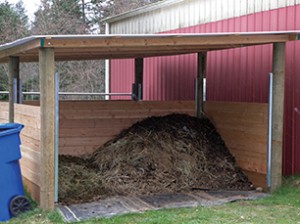 To protect the quality of our fresh and marine waters, it’s very important for livestock owners to pick-up, store, and utilize or dispose of manure properly.
To protect the quality of our fresh and marine waters, it’s very important for livestock owners to pick-up, store, and utilize or dispose of manure properly.
Some of the beneficial reasons for managing livestock manure include:
- Protecting livestock and horses from living in an unhealthy environment. Manure can contaminate animal feed and sicken animals.
- Avoiding creation of a breeding ground for nuisance insects that carry diseases.
- Lessening the chance of parasite re-infestation, which can happen when internal parasites hatch in the manure and mud and are then ingested by the animals.
- Preventing the contamination of groundwater and surface waters by manure, which is harmful to fish, aquatic life, and people, and stimulates growth of aquatic weeds.
In order to benefit from the natural fertilizers in your animal manure, improve your soil, and reduce the costs of chemical fertilizers, manage your manure by:
- Collecting manure from stalls, paddocks, confinement areas and pastures every day or two, storing it in a covered storage bin or an area covered with a tarp. The tarp will keep the manure from being saturated in the winter and from weed seeds landing on it in the summer.
- Applying composted manure to pastures only during the growing season, April through October. Apply about a half inch of compost at a time but limit coverage to a maximum of 3–4 inches per year. This provides macro and micro nutrients to the soil and adds organic material that improves water infiltration, moderates compaction, and provides healthy probiotics to the soil. Compost also improves the pH of the soil, making it more ideal for grass growth.
- Selling, trading or giving away composted manure which is often coveted by community gardens, neighbors, nurseries, garden clubs, or topsoil businesses.